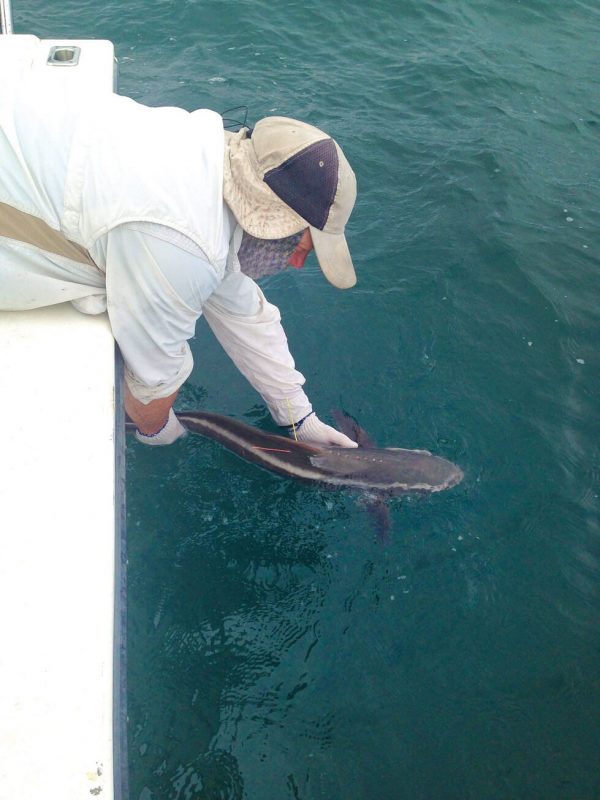
Angler’s who land cobia over the next few years should keep an eye out for tags. By reporting them, they will help scientists with the Florida Fish and Wildlife Conservation Commission’s Fish and Wildlife Research Institute track movement of the fish to learn more about the migration of the Gulf and Atlantic stocks.
The study involves tagging cobia using conventional dart tags and implanted acoustic transmitters to track mature fish. An array of acoustic receivers along the coast, maintained by various organizations in the FACT and ACT networks, can detect the individual fish when they swim nearby. These same networks have tracked white sharks and tripletail as they migrate through Florida. In addition, scientists are collecting genetics samples from tagged fish. The movement patterns will provide more information to management to make informed decisions on the stocks and to provide a geographical location of the biological stock boundary.
A total of 150 transmitters (50 each in Florida, Georgia and South Carolina) will be used for the one-year study. The transmitters will last for up to four years, so researchers will continue to collect information after the initial report is complete. The research will employ charter boat captains and recreational fishermen to assist with cobia capture, acoustic tag implantation and genetic sample collection. There is a strong need for fisheries-dependent data collection for the species because cobia are rarely encountered by regular fisheries independent sampling programs. Researchers from Kennedy Space Center’s Ecological Program, the Georgia Department of Natural Resources and the South Carolina Department of Natural Resources are assisting in the project.
Cobia are federally managed. Since the 2012 SEDAR 28 assessment, the Gulf and Atlantic stocks have been managed separately due to differing life history characteristics, such as growth rate and maximum age. Previous tagging data suggested the biological stock boundary between Gulf and Atlantic stocks was between Port St. Lucie, Fla. and Hilton Head, S.C. An amendment to the Coastal Migratory Pelagic Resources fishery management plan moved the demarcation line for cobia stock management to the Florida/Georgia border.
Cobia is a popular saltwater recreational fishery in the southeastern United States due to the ease of access, brute fighting strength and excellent culinary qualities. Although it is not illegal, scientists discourage the harvest of tagged cobia. If you catch a tagged cobia (two plastic tags should be visible on the back of the fish, one on each side) record the tag number, fork length, date and general location of the catch. Release the fish in good condition, and report it toll-free by calling 1-888-824-7472. If you accidentally harvest a tagged cobia please report all of the information above and return both the internal acoustic tag and plastic dart tag to:
Florida Fish and Wildlife Conservation Commission
Jim Whittington
Tequesta Field Laboratory
19100 SE Federal Hwy.
Tequesta, FL 33469.